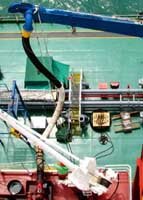February, 2020 - High Sulphur Fuel Carriage Ban
Are you ready for the carriage ban?
As of 1st March, 2020, ships that were not fitted with scrubbers will not be permitted to carry on board fuel with sulphur content in excess of 0.50%, even if such fuel is not intended to be used. Any non-compliant fuel remaining on board will therefore need to be removed by 1st March. To achieve this will, in most cases, entail careful planning and timing. Even though the majority of operators will have plans in place to achieve this, it is likely that unforeseen factors may result in some ships being unable to meet the deadline.
When the new MARPOL sulphur regulations came into force on 1st January, 2020, restricting the sulphur content of consumed fuel to 0.50%, ship operators were effectively given a grace period of two months to remove all remaining non-compliant fuel from their ships. On 1st March, 2020, the “carriage ban” will come into force and thereafter it will be forbidden to carry any non-compliant fuel on board. The approach of individual port states to non-compliance will vary, but it is likely to result in fines and detention in many cases.
Ensuring the complete disposal of non-compliant fuel in time for the carriage ban will invariably entail careful planning and cooperation between owners and charterers in working out a bunkering strategy, keeping in mind fuel prices, supply timing, machinery fuel consumption patterns and the ship’s trading schedule. Where it is necessary to de-bunker and dispose of non-compliant fuel, factors such as availability of disposal facilities and applicable regulations at the port where the bunkers are to be disposed will also need to be considered. Not all ports allow disposal and there may well be many ships seeking to dispose of fuel at the same time.
Despite best laid plans, whether due to unforeseen events or unanticipated factors, there may nevertheless be scenarios were a ship ends up with non-compliant fuel on board after 1st March 2020. For example, non-availability of compliant fuel at the scheduled bunkering port, an unanticipated delay which sets back the ship’s bunkering plans, operational limitations which prevent fuel discharge, unavailability of discharge facilities or the provision of fuel that is off specification for sulphur content might all result in a ship being left with non-compliant fuel on board. In addition to the potential for fines, there are likely to be consequential delays and knock-on costs involved in dealing with such scenarios. Owners and charterers alike will be looking to find a solution which minimises liability and disruption to the ship’s schedule.
Each situation will need careful consideration on a case-by-case basis. Off-hire provisions and relevant bunkering clauses will need to be reviewed. In practical terms, it is generally advisable to follow MEPC.1/Circ.881, consulting the port state and flag state to agree on a solution. If in doubt, Members are invited to contact the Managers for guidance.
